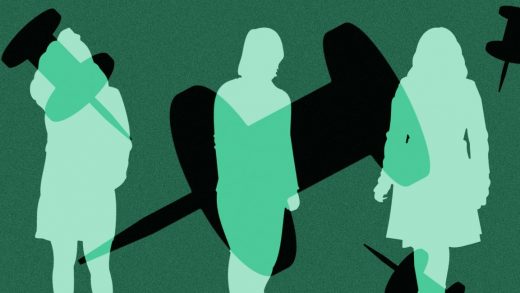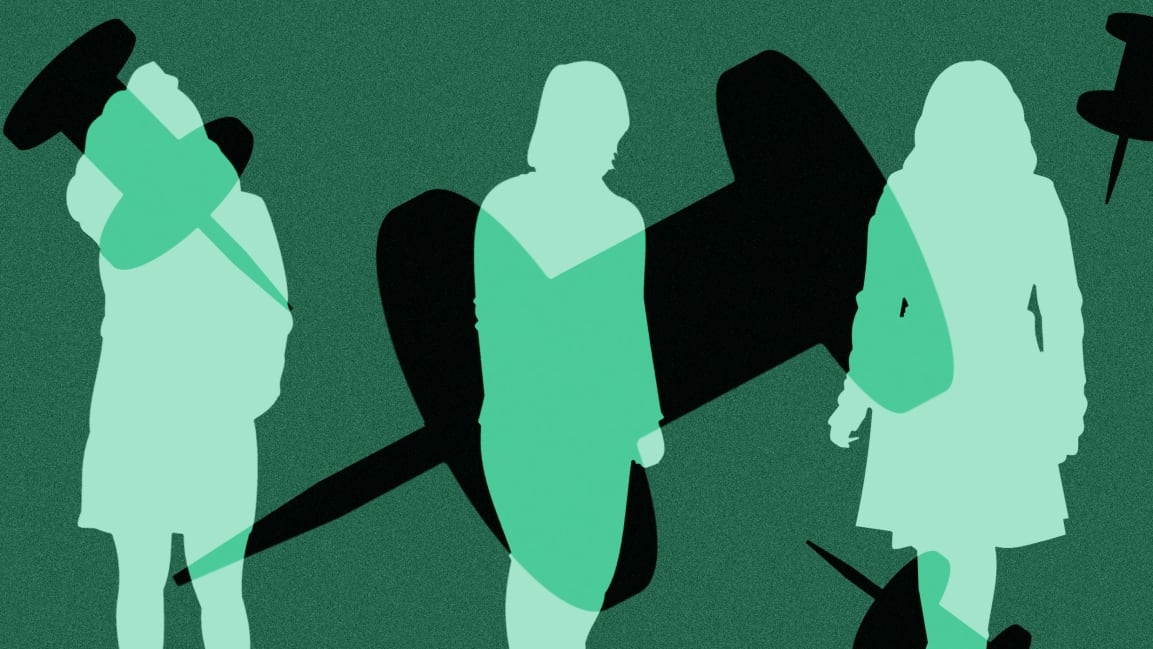‘Blatant racism in practice’: For Pinterest whistleblowers, COO’s settlement is a slap in the face
Earlier this week, Pinterest settled a gender discrimination lawsuit with its former chief operating officer for $22.5 million—one of the largest public individual settlements for gender discrimination in history. The eight-figure award goes to Francoise Brougher, once the number two executive at Pinterest, who says she was fired in retaliation for raising claims of pay disparity, discrimination, and exclusion at the virtual pinboard company.
But despite its historic nature, the settlement also reveals a stark difference between how Pinterest compensated Brougher, a white woman, and how it responded to two Black women who were the first to criticize the company’s workplace culture.
Ifeoma Ozoma and Aerica Shimizu Banks went public in June with allegations of racial and gender discrimination, two months before Brougher filed suit. Their stories generated a media firestorm, inspired additional women to speak out, and fueled a social media backlash against Pinterest, which until then had maintained a reputation as the nicest company in tech.
The publicity was a major factor in Brougher’s suit. As she told me in October, it was Ozoma and Banks that “gave [her] the courage to come forward.” A settlement arrived just four months later, a whirlwind timeline considering that gender discrimination suits can drag on for years. “Her team was able to establish a culture of discrimination that could not be questioned because of us,” Ozoma says.
Ozoma and Banks first built the pressure to force change at Pinterest. While the company initially said that the two were treated fairly, CEO Ben Silbermann soon acknowledged that its culture was “broken” and committed to an external, independent review (the results of which were released today). The company has since appointed two Black women, media executives Andrea Wishom and Salaam Coleman Smith, to its board, hired a head of inclusion and diversity, and entered into a partnership with the NAACP to form an inclusion advisory council. Earlier in December, shareholders of Pinterest filed a lawsuit against the company’s board of directors and executives based in large part on Ozoma, Banks, and Brougher’s allegations.
At the same time, according to The Verge, Ozoma and Banks received less than one year’s worth of severance when they settled with Pinterest. Pinterest has not publicly apologized to either woman, and nobody involved in the scandal has been fired.
Brougher praised the “meaningful steps” the company had taken in a joint statement with Pinterest about her settlement. She says she does not know the details of Pinterest’s settlement negotiations with Ozoma and Banks. “I believe they have already settled with Pinterest and I don’t know the specifics of that settlement,” Brougher wrote in an email.
A Pinterest spokesperson confirmed that the company does not comment on the details of legal negotiations but otherwise declined to comment on this story.
“Blatant racism in practice”
Criticism of Pinterest’s response to Ozoma and Banks has underscored the way that race and class intersect in Silicon Valley’s treatment of gender discrimination claims.
“This week, we saw, yet again, another large corporation display clear inequitable treatment of Black employees in Silicon Valley,” says Jade Magnus Ogunnaike, senior campaigns director at the racial equity organization Color of Change. “Pinterest’s handling of Francoise Brougher’s lawsuit—paying out $22.5 million—compared to how the company practically ignored Ifeoma Ozoma and Aerica Shimizu Banks after they called out intense discrimination, is blatant racism in practice.”
The settlement includes a joint statement with Pinterest in which Brougher says she “is encouraged that Pinterest is committed to building a culture that allows all employees to feel included and supported.” In its part of the statement, which Brougher shared on Twitter, Pinterest says it “recognizes the importance of fostering a workplace environment that is diverse, equitable, and inclusive and will continue its actions to improve its culture.”
In addition, Brougher and Pinterest agreed to jointly donate $2.5 million to nonprofits that support women and underrepresented minorities in tech. “This litigation I brought in has always been about accountability and ability to drive changes,” Brougher said in an interview. “And I felt through this settlement I met my objective and I have a chance now to do something good.”
For Ozoma, the focus on gender is a smokescreen that obscures the bigger picture.
“This was Pinterest’s way of making crystal clear how little Black women are actually valued and it was their way of solving the ‘gender piece’ without so much as acknowledging the race piece,” she tells me.
While some are applauding the settlement’s historic nature and pointing to how it reveals a shift in how seriously claims of gender discrimination are taken, others have criticized Brougher’s decision to not include Ozoma and Banks in the settlement after capitalizing on the risks they took by coming forward.
For those who ask about examples of white privilege…
This is another example of Black women saving themselves, risking it all for nothing in return. I’m very proud of @IfeomaOzoma and @erikashimizu. You deserved/deserve everything and more. https://t.co/C2oPaVUrKT
— Dr. Akilah Cadet, MPH (@changecadet) December 15, 2020
Read: White woman executive gains $20m from Pinterest. Black women, as usual, are the ones to take the first important steps. Without @erikashimizu & @IfeomaOzoma this wouldn’t have happened. And the lack of acknowledgement for their sacrifice is deafening. https://t.co/p8nTAtiPi5
— Ailsa M. Blair (@ailsamblair) December 15, 2020
It’s truly and completely fucked that @IfeomaOzoma and @erikashimizu went public, put their careers and reputations on the line, and got less than a year severance when the exec their labor helped convince to go public settles for $22.5m. https://t.co/pne6RNpCZj
— Christina Warren (@film_girl) December 15, 2020
“What I was heartened and disappointed by is that it was so plain and obvious to people how wrong this was,” Banks says. “And yet Pinterest sees nothing wrong with this. This is so typical. The blatantness of it and the extreme asymmetry of it is very typical and follows a long line in history.”
The massive gap between what Pinterest paid Brougher as compared to Ozoma and Banks has also raised eyebrows. “$20 million would be life changing, not just for us but for everyone in our families,” Ozoma says. “That is the definition of generational wealth, as it would be for most people.”
Sara Mauskopf, the CEO and cofounder of childcare platform Winnie, wrote on Twitter that Brougher and Pinterest’s donation to nonprofits is nothing more than “diversity theater”—a term that refers to the way that companies or people publicize actions designed to make it appear they care about diversity, while doing little or nothing to actually achieve inclusion and equity.
A tale of two settlements
Brougher, who joined Pinterest in 2018 as COO and had roughly 2,000 direct reports, has wrestled with her own complicity in a system where women’s voices are routinely silenced, but says she has championed Ozoma and Banks in their efforts.
“I always have been supportive of Ifeoma and Aerica,” Brougher says. “The issues they’ve brought up are very important. It always has been about accountability and creating changes and I do think that $2.5 million joint investment demonstrates that both Pinterest and I are both committed to improving diversity and inclusion in the tech industry.”
In a blog post she wrote when first announcing the lawsuit in August, Brougher acknowledged that she did not do enough to help women at Pinterest and apologized for it. “I did not answer the few requests I did receive from women to be a more vocal champion,” she wrote. “Sometimes I even made excuses for the men they confided in me about.”
Brougher says now that she hopes the settlement paves the way for other women to tell their stories and seek legal recourse against discrimination. “For the broader industry, I think it’s important for the women who will come after me that they can point to this settlement [as] a precedent,” she says.
But for the women who came before her, the settlement is a reminder of how little Pinterest has done to rectify their situation—and how Brougher herself did not help them along when she had the chance.
“It’s not an act of carelessness or thoughtfulness to have not informed us about the settlement, to have not involved us, to have drafted this statement the way it was written, any of that,” Banks says. “It was intentional and deliberate exclusion.”
Fast Company , Read Full Story
(46)



